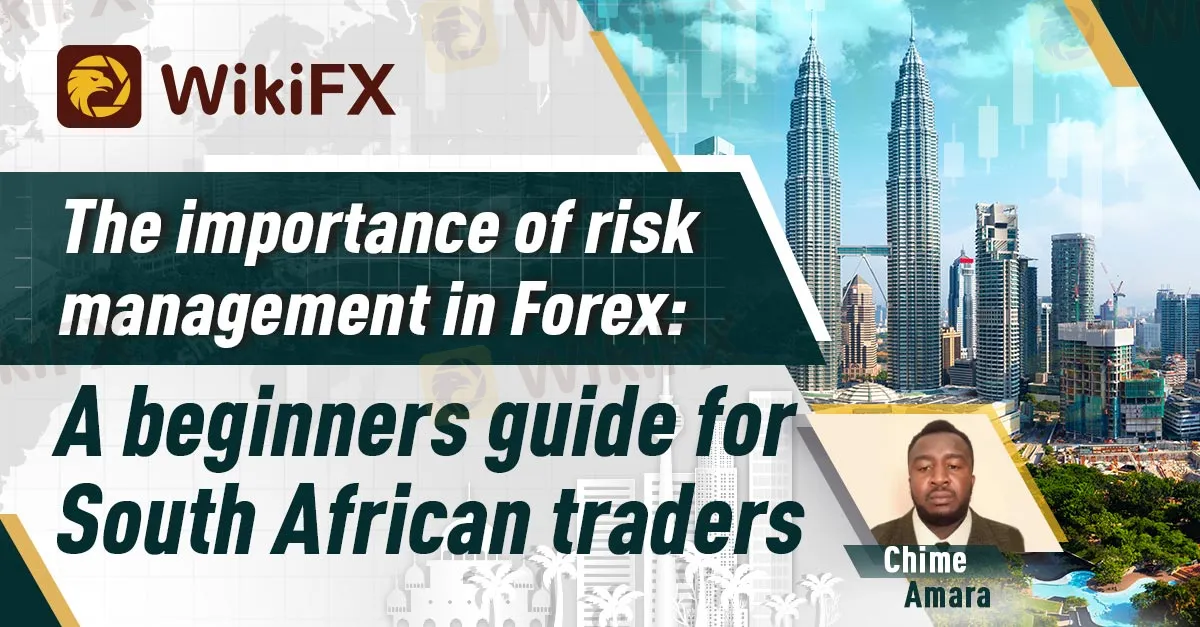简体中文
繁體中文
English
Pусский
日本語
ภาษาไทย
Tiếng Việt
Bahasa Indonesia
Español
हिन्दी
Filippiiniläinen
Français
Deutsch
Português
Türkçe
한국어
العربية
The importance of risk management in Forex: A beginner’s guide for South African traders
Abstract:The quest to make quick profits from the market has often led some traders to neglect the need for applying proper risk management practices while taking any positions in the market. Some traders tend to trust so much in the accuracy of their analysis and predictions that they neglect that the market can as well disappoint. The outcome of this negligence is always unbearable and often, had resulted in such traders losing their entire capital. Proper risk management practices remain the best way for guarding against loss and remaining profitable in the forex market today.

By: Chime Amara

What is Risk management?
Risk management is the practice of guarding against excessive loss by protecting one's position should the market go contrary to the trader's predictions.
What are the risk management practices?
There are basically four major risk management practices obtainable in forex trading. We have discussed them below.
A. Use of Stop loss: Stop loss is an important risk management practice that involves setting a pending order below or above one's position to close one's open position should the market take the opposite course of the trader's forecast. Often a Stop loss order is set 30 - 50 pips away from one's entry. Some prefer mapping out only 1% of their capital as the stop loss target.
B. Setting take-profit target: The fact that the market often spiked to hit certain levels and then reverse from it, has made it very necessary for traders to set their targets for each position they take in the market today. Setting a take-profit order helps to close one's trades when the market gets to the indicated level.
C. Correct use of Lotsize: Lotsize is the buying power due to each trader based on his capital. One of the greatest means through which traders can manage their risk well is by choosing the correct lotsize due to their capital. Using excessive lotsizes endangers the trader's capital in cases where the market goes against him.
D. Hedging: Hedging involves taking two different positions at the same time in the market as a way of guarding against loss. Here the trader often placed a new trade above or below his stoploss to be triggered in cases when the market reverses and cuts off his stop loss target. Similarly, hedging includes but is not limited to taking two opposite positions at the same time.
Conclusion
The importance of risk management practice in forex trading can never be overemphasized. Thus, without proper risk management practice put in place, the trader is all the more exposed to losing a greater part of his capital due to high market volatility. It is therefore necessary for all forex traders to apply proper risk management practice while taking any positions in the market today.

Disclaimer:
The views in this article only represent the author's personal views, and do not constitute investment advice on this platform. This platform does not guarantee the accuracy, completeness and timeliness of the information in the article, and will not be liable for any loss caused by the use of or reliance on the information in the article.
Read more

Top 10 Trading Indicators Every Forex Trader Should Know
Master the top 10 Forex trading indicators to analyze real-time Forex quotes, trends, and market signals. Learn strategies to boost accuracy and avoid mistakes.

Geopolitical Events: What They Are & Their Impact?
You've heard many times that geopolitical events have a significant impact on the Forex market. But do you know what geopolitical events are and how they affect the FX market? Let us learn about it today.

Why Do You Feel Scared During Trade Execution?
Trade execution is a pivotal moment for traders. It is when analysis turns into action, and potential profits or losses become reality. However, for many traders, this moment is accompanied by fear. Why does this happen, and how can you address it?

WikiEXPO Global Expert Interview: Simone Martin—— Exploring Financial Regulation Change
In the midst of financial innovation and regulation, WikiGlobal, the organizer of WikiEXPO, stays abreast of industry trends and conducts a series of insightful and distinctive interviews on pivotal topics. We are delighted to have the privilege of inviting Simone Martin for an in-depth conversation this time.
WikiFX Broker
Latest News
Geopolitical Events: What They Are & Their Impact?
Volkswagen agrees deal to avoid Germany plant closures
Top 10 Trading Indicators Every Forex Trader Should Know
TradingView Launches Liquidity Analysis Tool DEX Screener
MultiBank Group Wins Big at Traders Fair Hong Kong 2024
WikiEXPO Global Expert Interview: Simone Martin—— Exploring Financial Regulation Change
'Young investors make investment decisions impulsively to keep up with current trends' FCA Reveals
Why Do You Feel Scared During Trade Execution?
CySEC Settles Compliance Case with Fxview Operator Charlgate Ltd
Malaysian Influencer Detained in Taiwan Over Alleged Role in Fraud Scheme
Currency Calculator


